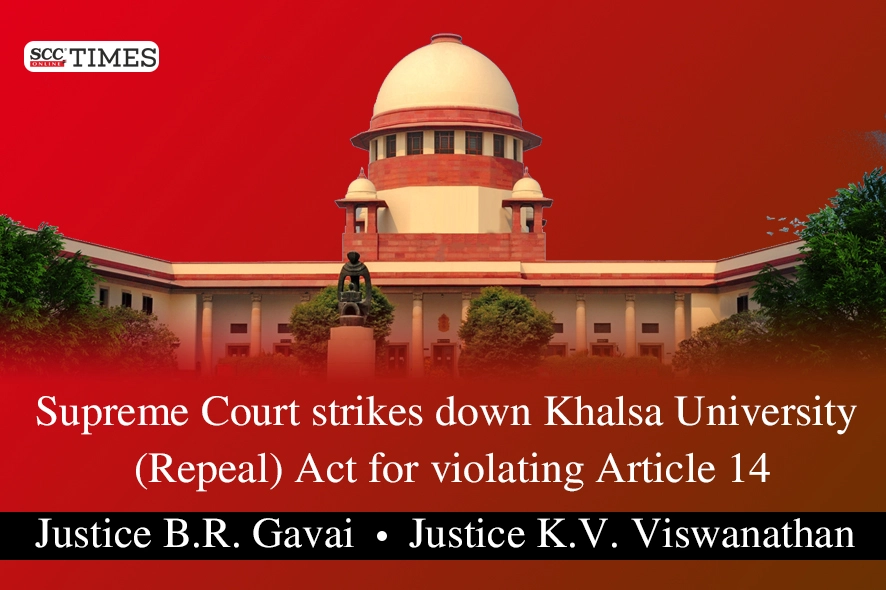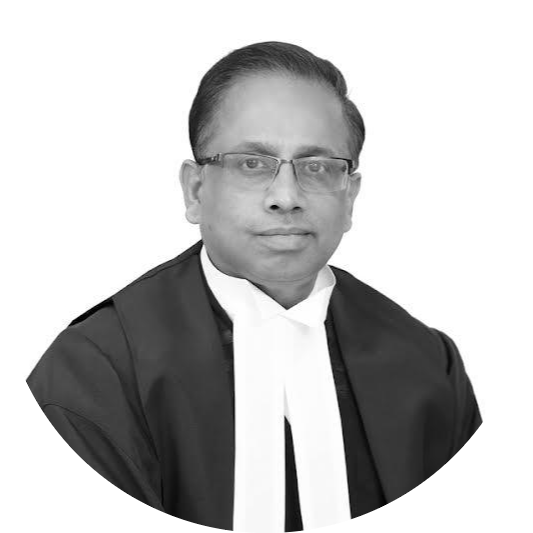Supreme Court: In an appeal challenging the final judgment and order passed by the Division Bench of the Punjab and Haryana High Court, whereby the High Court dismissed the writ petition filed by Khalsa University and the Khalsa College Charitable Society praying for quashing “The Khalsa University (Repeal) Act 2017”, the division bench of BR Gavai* and KV Viswanathan, JJ. held that the Impugned Act singled out the Khalsa University amongst 16 private Universities in the State and no reasonable classification has been pointed out to discriminate the Khalsa University against the other private Universities. Thus, while setting aside the same, the Court held that the Impugned Act would be discriminatory and violative of Article 14 of the Constitution.
Background:
In 2010, the State of Punjab framed the Punjab Private Universities Policy, 2010. The Khalsa College Charitable Society, Amritsar, which was in existence since 1892, submitted a proposal to the State Government for setting up a self-financing University in the State based on the 2010 Policy. On 7-11-2016, the Punjab Vidhan Sabha passed the Khalsa University Act, 2016. The 2016 Act received the assent of the Governor of Punjab on the same day. On 18-01-2017, the Registrar of Khalsa University communicated to the Principal Secretary, Department of Higher Education, Government of Punjab, that they have enacted the Statutes of the Khalsa University in consonance with the 2010 Policy, the 2016 Act and University Grants Commission guidelines. On 6-04-2017, the Superintendent of Higher Education Department, Government of Punjab, communicated to Khalsa University that no admission process will be started till the Statues of the University are approved by the State Government. On 30-05-2017, the State Government promulgated an Ordinance thereby repealing the 2016 Act. Shortly thereafter, the Punjab Vidhan Sabha passed the Khalsa University (Repeal) Act, 2017, which received assent of the Governor.
Aggrieved by the communications and the promulgation of the Ordinance and passing of the Impugned Act, the Khalsa University and Khalsa Society (‘appellants’) filed a Writ Petition before the Punjab and Haryana High Court. The High Court dismissed the writ petition. Thus, the appellants filed the present appeal.
Issues, Analysis and Decision:
-
Whether an enactment for giving out a differential treatment to a single entity is valid in law or not?
The Court reiterated that even legislation dealing with a single entity, or an undertaking would be permissible in law, if it is based on a reasonable classification having nexus with the object to be achieved. The classification should be such wherein an entity or an undertaking to whom special treatment is provided can be singled out on the basis of some reasonable classification from the others in the same class.
After taking not of various Constitution Bench decisions, the Court concluded that wherever this Court has upheld the legislation affecting the single entity, institution or undertaking, it found that it was done in emergent and extreme circumstances preceded by enquiries, parliamentary debates, etc. It was done when the legislature took into consideration the relevant material and found it expedient to do so. Further, there will be a presumption with regard to the validity of the enactment and the burden would be on the person who challenges the same.
Concerning the present case, the Court said that the Impugned Act is a single entity legislation repealing the 2016 Act by which the Khalsa University was established. The only reasoning as could be found in the Statement of Object and Reasons (‘SOR’) of the Impugned Act is that the Khalsa College, Amritsar has, over a period, become a significant icon of Khalsa Heritage and the appellants were likely to shadow and damage its character and pristine glory.
The Court noted that the Khalsa University has specifically averred that it has been singled out by the State Government amongst 16 Universities. It has also been averred that there is absolutely no reason or justification whereby the Khalsa University could be ordered to be shut down in such a discriminatory manner. The Khalsa University has also made specific averments regarding discrimination because there are a greater number of Universities in Malwa region and Doaba region as against the Majha region.
The Court noted that no material was placed on record as to what was the compelling and emergent situation to enact a law which could affect the Khalsa University. No material was placed on record to show that there were any discussions prior to the Impugned Act being passed or as to what material was placed and taken into consideration by the competent legislature.
After relying on Charanjit Lal Chowdhury v. Union of India, 1950 SCC 833, the Court said that since the Khalsa University had specifically pleaded a ground regarding discrimination, it was incumbent upon the respondents to have dealt with the said challenge.
Therefore, the Court held that the Impugned Act singled out the Khalsa University amongst 16 private Universities in the State and no reasonable classification has been pointed out to discriminate the Khalsa University against the other private Universities. The Impugned Act therefore would be discriminatory and violative of Article 14 of the Constitution.
-
Whether the Impugned Act is liable to be struck down on the ground of manifest arbitrariness?
The Court placed reliance on Shayara Bano v. Union of India, (2017) 9 SCC 1, wherein it was held that the test of manifest arbitrariness would also apply to invalidate legislation as well as subordinate legislation under Article 14. It was held that manifest arbitrariness must be something done by the legislature capriciously, irrationally and/or without adequate determining principle. When something is done which is excessive and disproportionate, such legislation would be manifestly arbitrary. Thus, arbitrariness in the sense of manifest arbitrariness would apply to negate legislation under Article 14 of the Constitution.
The Court noted that the only reasoning given in the SOR of the Impugned Act is that the Khalsa College has, over a period, become a significant icon of Khalsa heritage and the University established in 2016 is likely to shadow and damage its character and pristine glory.
Further, the Court also noted that the Khalsa College which was established in 1892 is not a part of the Khalsa University. The only colleges which were affiliated with the Khalsa University are the Khalsa College of Education, Amritsar established in 1954, Khalsa College for Women, Amritsar established in 1968 and Khalsa College of Pharmacy, Amritsar established in 2009.
The Court said that though it is the stand of the appellants that they were in the process of establishing new institutions for getting them affiliated with the Khalsa University, a specific undertaking was given that the Khalsa College would not be touched or adversely affected by the establishment of the Khalsa University.
After perusing the maps placed on record which show the placement of Khalsa College in the campus along with the other institutions, the Court noted that it is only the Khalsa College established in 1892 which is a heritage one. All other buildings have been subsequently constructed having no resemblance with the Khalsa College building. Thus, the very foundation that Khalsa University would shadow and damage the character and pristine glory of Khalsa College which has, over a period, become a significant icon of Khalsa heritage is on a non-existent basis. Therefore, the Impugned Act, which was enacted with a purpose which was non-existent, would fall under the ambit of manifest arbitrariness and would therefore be violative of Article 14 of the Constitution.
Thus, the Court set aside the Impugned Act.
CASE DETAILS
|
Citation: Appellants : Respondents : |
Advocates who appeared in this case For Petitioner(s): For Respondent(s): |
CORAM :









